




 |
   |
 |
 |
7" (1975) ***/TTT Obala Pusta, Obala Vrela Prva Ljubav |
Current availability:
Mellotron used:
It can't have been easy playing interesting music in Communist Eastern Europe in the '60s and '70s, even in a relatively liberal, non-Russian aligned country like Yugoslavia. See: Hungary's Omega. Indexi (formed as far back as 1962) were an adventurous bunch, who doubled their mainstream schlager pop career with one as one of their nation's first psychedelic/progressive outfits, breaking out of the singles-only market as late as 1971, with Indeksi. Saying that, 1975's Obala Pusta, Obala Vrela b/w Prva Ljubav is a non-album progressive pop 7", both sides sounding like a slightly uneasy cross between their two careers, the 'A' (to my surprise) being proggier than its flip.
Enco Lesić plays Mellotron, slathering flutes and strings all over both sides of the record, to most pleasing effect. Which Mellotron? Unknown, but I'm pretty sure there was one secreted away in a Sarajevan studio, as a good few artists from the region used one. So do you bother with this single? It's not bad, it's on YouTube. Your choice.
See: Davor | Goran Gerin
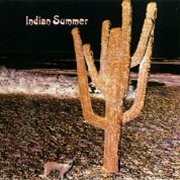 |
Indian Summer (1971, 49.50) ***½/TTGod is the DogEmotions of Man Glimpse Half Changed Again Black Sunshine From the Film of the Same Name Secrets Reflected Another Tree will Grow |
Current availability:
Mellotron used:
Indian Summer fall fairly and squarely into the 'UK proto-prog' category, along with Spring, Beggars Opera, Gracious! and many others; think 'late-'60s feel in the early '70s' and you're getting near. This isn't a criticism by any means; many of these bands were excellent, but had the misfortune to head up one of music's blind alleys. Pink Floyd aside (who were always completely a law unto themselves, anyway), the progressive bands who 'made it' were mostly those who had the courage to really push at the boundaries and leave the '60s behind.
Indian Summer's a good album, though, with several lengthy Hammond workouts, but it fails to transcend its influences and create anything genuinely new. Opener God Is The Dog is one of its best tracks, Bob Jackson's Mellotron lifting it towards its conclusion. The Mellotron is used sparingly and tastefully throughout, in fact, although you sometimes feel they could've used a little more without spoiling the pudding.
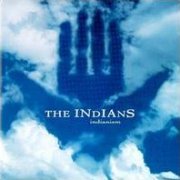 |
Indianism (1993, 46.00) **½/TT |
|
| Bed of Roses Love A-I-A-O Look Up to the Sky The Key Caught a Rainbow Believe I Love the World |
Head in the Clouds If the Children Ask Why |
|
Current availability:
Mellotron used:
It's not easy to track down information on a band called The Indians, even when they have the good grace not to name their (probably) sole album eponymously. 1993's Indianism has its moments, in a pop/rock kind of way, but, by and large, is a bit too wishy-washy to make any great impression, despite a handful of decent tracks, notably opener Bed Of Roses and the heavier The Key.
'John Brian' plays Mellotron; quite certainly our old friend Jon Brion, before he acquired enough of a name to get his name spelled properly. It could be on most tracks, but I'm of the opinion that you'll only hear distant flutes on opener Bed Of Roses, strings and flutes on Look Up To The Sky and Caught A Rainbow and strings on If The Children Ask Why, all excellently-played and not too low in the mix. Overall, powerpop aficionados may find parts of the album palatable, but it didn't grab this particular listener. Not bad Mellotron use, though, especially for the early '90s.
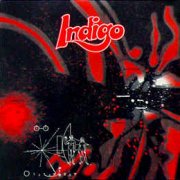 |
Indigo (1984, 39.31/51.10) **½/T½ (TT) |
|
| Guardians of Life America Angels Have No Mercy Oh, My Girl Children of the Past I Saw Them Fall (Magill's Story) Man on the Run Sunrise in the Mountains |
Foxhunt [CD-R bonus track: Nightwatch] |
|
Current availability:
Mellotron used:
Indigo rose from the ashes of Kyrie Eleison, debuting with their eponymous 1984 release. It seems their remit was to combine their fairly lightweight take on prog with upbeat, poppy numbers, to which I can only say: job done, chaps, for better or worse. (Clue: worse). Proceedings start well enough with the near-eight minute Guardians Of Life, while the six minutes of I Saw Them Fall (Magill's Story), Man On The Run and seven-minute closer Foxhunt sound like the proggier end of Genesis' Duke era, for what that's worth. Sadly, the remainder of the record quickly slumps into a slough of despond with the crummy pop of America, Oh, My Girl, Children Of The Past and the like, although the eleven-minute Nightwatch, added to the recent CD-R/Bandcamp reissue is the proggiest thing here, as you'd expect.
Gerald Krampl plays his own M400 on most of the proggish tracks, unsurprisingly, with strings on Guardians Of Life, I Saw Them Fall (Magill's Story) and Foxhunt from the original album, plus bonus track Nightwatch. This is half-passable/half-awful, although its proggier moments are worth hearing, if some way from 'classic'.
See: Kyrie Eleison
 |
Den Stille Gaten (1974, 41.11) **/T |
|
| Den Stille Gaten Han Kjente Seg Mye Eldre Sol i Desember Jeg Kommer Tillbake Etter 50 År That Gentle Touch Jeg Har Brent Mine Lys Rock-Ola (Jeg Savner Deg) |
Det Best Jeg Vet You Hurt Me Again Send Ditt Svar Med Vinden Er det Plass for Oss Alle |
|
Current availability:
Mellotron used:
Inger Lise is actually Inger Lise Rypdal, then-wife of renowned Norwegian jazzer Terje, 1974's Den Stille Gaten (The Quiet Street) being her fourth, mostly Norwegian-language album. It's an exceedingly mainstream '70s pop record, veering between upbeat nonsense (Etter 50 År, Rock-Ola (Jeg Savner Deg)) and balladic nonsense (That Gentle Touch, Jeg Har Brent Mine Lys). Anything actually listenable? You Hurt Me Again's funky and jazzy touches make it the least tedious thing here, but that's somewhat clutching at straws, frankly.
Pete Knutsen (Popol Vuh/Ace) plays Mellotron (presumably the Popol M400), with chordal flutes on the opening title track and Sol I Desember, quite distinct from the orchestral woodwinds heard elsewhere, while the strings on That Gentle Touch and You Hurt Me Again emanate from a Solina. Seriously, don't bother.
 |
In Hoc Signo (2013, 63.39) ***½/TT |
|
| Introduzione Cavalcata Mare in Tempesta Via Egnatia L'Assedio di Antiochia Fuga da Amman Kairuv'an Masqat |
Jangala Mem Il Vento del Tempo Finale |
|
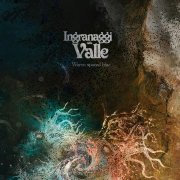 |
Warm Spaced Blue (2016, 44.36) ***½/TTT½Call for Cthulhu: OrisonInntal Call for Cthulhu: Through the Stars Lada Niva Ayida Wedo Call for Cthulhu: Promise |
Current availability:
Mellotrons used:
Ingranaggi della Valle are another entrant in the 'modern RPI' stakes, doing their level best to be as creative as the multitude of Italian progressive rock acts of the '70s. And you know, they might just have managed it? 2013's In Hoc Signo is a fine album, although... it's too long. Yup, that one again. It's not only too long, but the band throws too many ideas at it, to the point where their message becomes diluted. Case in point: the jazz piano solo in Masqat, which adds nothing to the proceedings. However the good stuff (often featuring Marco Gennarini's excellent violin work) is really good, not least L'Assedio Di Antiochia, Kairuv'an and crazed closer Finale. Mattia Liberati plays the Studiosette M400 (also La Batteria's), with background choirs on Cavalcata, Via Egnatia and Jangala Mem, little choir stabs on L'Assedio Di Antiochia, string chords towards the end of Masqat, then finally, slightly more upfront strings on Il Vento Del Tempo and closer Finale. Using a Mellotron with restraint is generally a good thing, but sometimes you can use a little too much restraint...
Three years on, Warm Spaced Blue hones their sound to more 'typical' RPI, removing their jazzier aspects, while trimming the whole thing down to vinyl length. I'm not convinced they've kept their quality control up, mind; while good, this falls short of 'excellent' in places. Highlights? Angular opener Call For Cthulhu: Orison, violin-driven epic Inntal and closer Call For Cthulhu: Promise, perhaps. I might be being unfair here; this may well grow on the listener with repeated plays, like all the best prog. Liberati and Alessandro di Sciullo on Mellotrons, both the Studiosette machine and a (borrowed?) M4000, with strings and flutes all over Call For Cthulhu: Orison, a flutes and choirs on Inntal, great slabs of strings and cellos on Lada Niva, strings on Ayida Wedo and chordal flutes on Call For Cthulhu: Promise, alongside Paolo Lucini's real one, plus choirs. Possibly not the best of their two albums, but definitely the more Mellotron-heavy one. The band are promising a third album before the sun goes cold; I know how difficult it can be, but it's getting on for a decade, now...
 |
Innaway 2 (2011, 44.37) ***½/T½Conversations in a DreamSitting on a Rooftop The Underground Four More Hours Till Dawn Black Sheep Pride H-Bomb Bicoastal Blues Bottomless Pit Honeybee |
Current availability:
Mellotron used:
Innaway are a Californian psych outfit with links to The Brian Jonestown Massacre, amongst others. Their second album, 2011's Innaway 2, mixes various American styles into a modern psychedelic stew, the psych/blues-rock of opener Conversations In A Dream sitting next to the vaguely glammy Sitting On A Rooftop, the indie-esque The Underground, the country/blues of Four More Hours Till Dawn and even the psych/Spaghetti western of closer Honeybee. Variety? We goddit. But does it work?, I hear you cry. Yes, generally speaking, although the album could be accused of slightly lacking cohesion in places.
Jim Schwartz and Reid Black play Rob Campanella's M400 on two tracks, with a solo string part kicking the album off nicely on Conversations In A Dream, with echoed flutes and more of those strident strings later on and occasional octave strings on Four More Hours Till Dawn, although the choirs (doubling real voices) on Black Sheep Pride are samples, I'm told. All in all, a fine release, pretty much guaranteed to keep modern psych fans happy; better then the Brian Jonestown chaps, anyway.
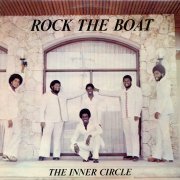 |
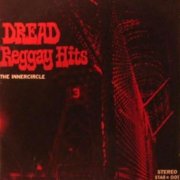 |
Rock the Boat [a.k.a. Dread Reggay Hits] (1974, 46.37) ***/TT½ |
|
| You Make Me Feel Brand New I'm Going Home Here I am Baby Westbound Train Duppy Gunman Book of Rules Homely Girl Rock the Boat |
Some Guys Have All the Luck Everything I Own None Shall Escape the Judgement Curfew Have Some Mercy T.S.O.P. |
||
Current availability:
Mellotron used:
Unusually for a reggae outfit, Inner Circle (still active today) are a proper band, as against a featured singer with backing musicians. Their debut, 1974's Rock the Boat (issued in Jamaica with two tracks cut as Dread Reggay Hits), combines covers of US soul hits with a handful of originals, more recognisable numbers including You Make Me Feel Brand New (The Stylistics), Rock The Boat (Hues Corporation) and Everything I Own (Bread/Ken Boothe). This is mainstream reggae, with nary a hint of revolutionary activity about it, but then, so was most reggae, contrary to contemporary popular opinion.
Charlie Roberts plays Mellotron, with strings all over opener You Make Me Feel Brand New, I'm Going Home, Some Guys Have All The Luck and closer T.S.O.P., plus choirs on the last-named. Unless you're already a fan of pop-reggae, you're really not going to go for this at all, but it's perfectly good at what it does, with the added bonus of four decent Mellotron tracks.
 |
Rainbro (2012, 52.42) ***½/TT |
|
| Knee Oom Pah Missing the Train Rainbro Too Good to Be True Somnambulist Subversion Nut Job Forgotten Planet |
Dirty Spoons 25 Miles to Freedom |
|
Current availability:
Mellotron used:
ProgArchives label Inner Ear Brigade 'RIO [rock in opposition]/avant-prog', which pretty much sums up Rainbro. I'd be lying if I were to tell you that this is an easy listen, but, as with many 'difficult' albums, I'm sure the long-term benefits outweigh the short-term struggle. Melody Ferris' vocal melodies tend towards the angular, as does much of the music, possibly at its best on Forgotten Planet and ten-minute closer 25 Miles To Freedom, although the jazzy Knee, followed by the white-boy funk of Oom Pah, were possibly not the best two tracks with which to open the album.
Nick Peck (once of Californian proggers Episode) plays (I presume) his own M400, with strings on Missing The Train, the title track and 25 Miles To Freedom, plus flutes on Forgotten Planet. Hard work, but perseverance will undoubtedly pay off, almost certainly aided by a handful of Mellotron tracks. Possibly.
See: Nick Peck
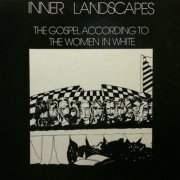 |
The Gospel According to the Women in White (1983, 37.47) ***/½ |
|
| Desire Over the Edge Angels Top of the Stairs Amnesia The Women in White Apocalypse of Man E.S.P. |
What's Happening I Need Love What You've Been Doing to Me |
|
Current availability:
Mellotron used:
I can tell you next to nothing about Inner Landscapes, other than that they were an American synthpop outfit, crossing over into late-period new wave, in a Flock of Seagulls kind of way. Appropriate, actually, since said outfit took their name from a Stranglers lyric, while this lot's 1983 release, The Gospel According to the Women in White, rather obviously send up Guildford's finest's The Gospel According to the Meninblack, from a couple of years earlier. At its best on Over The Edge, Top Of The Stairs and Amnesia, you'd be hard-pushed to describe this as 'classic', but it's certainly perfectly listenable.
Michael Pollack plays Mellotron on Angels, with a flute melody and chordal strings, although that would appear to be our lot. Just in case you thought otherwise, here's proof that utterly obscure albums aren't necessarily so for a reason. Worth hearing for genre fans.
 |
Kori no Sekai (1973, 37.31) **½/T |
|
| Akazu no Fumikiri Hajimari Kaerenai Futari Chie-Chan Kori no Sekai Shiroi Ichinichi Jiko Ken'o Kokoro Moyou |
Machibouke Sakura Sangatsu Sanpomichi Fun Koharu Obasan Oyasumi |
|
 |
Yōsuiseitan (1975, 43.17) **½/½ |
|
| Kandore Mandore Owari ga Nai no wa Byūtifuru Wandafuru Bāzu Yaminonakade Sā, o Nugi Hana ni Sae, Tori ni Sae Mado o Akero Kan'nadzuki ni Kakoma Rete |
Happī Bāsudē Nishokunokoma Kasaganai She Loves You I Saw Her Standing There |
|
Current availability:
Mellotrons used:
Yōsui Inoue is famous in his home country for being the first artist to sell over a million copies of one album, 1973's Kori no Sekai (World of Ice). The album was partially recorded in the UK, contributing musicians including Peter Robinson and John Gustafson from Quatermass, Ann Odell (Shawn Phillips) and arranger Nick Harrison (Rolling Stones). The material is pretty much what you'd expect of an album that sold so well; mainstream pop/rock with a Japanese folk influence on some tracks, all pretty unexciting, to be honest, although better tracks include sort-of rocking opener Akazu No Fumikiri and the memorable Machibouke. Mellotron duties are split between Robinson and Jun Fukamachi, with a lush string part on Kaerenai Futari and flute on Chie-Chan (under real strings), with real strings on several other tracks, too. Overall, far too mainstream to be of any real interest to all but early J-pop aficionados, with one decent Mellotron track.
1975's Yōsuiseitan appears to be a compilation, but Inoue's propensity for re-recording songs doesn't make it easy to work out what's going on here. Compilation or no, it's no great improvement on Kori no Sekai, largely enka-infused balladry, only really picking up on Mado O Akero, the more upbeat Happī Bāsudē (Happy Birthday, originally on 1974's Western-produced Nishokunokoma in one form or another) and the slow blues-rock of Kasaganai. The note-perfect renditions of She Loves You and I Saw Her Standing There stuck on the end? No idea. Kasaganai (or Kasa Na Gai), a totally different recording from the one on his debut album, 1972's Danzetsu, is also the recipient of the album's only Mellotron work, a brief string line towards the end of the track, adding little to the overall proceedings.
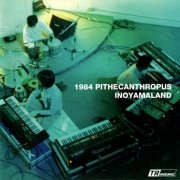 |
1984 Pithecanthropus (1999, recorded 1978-98, 58.06) ***½/TCollecting NetGlass Chaim Pokala Wässer Danzindan-Pojidon (including Meine Reflexion) Zapple Star Shüffer Wässer Apple Star~Glass Chaim |
Current availability:
Mellotron used:
Inoyama Land were the duo of Makoto Inoue (from Hikashu) and Yasushi Yamashita, who have released a handful of albums over a thirty-plus-year period. 1999's 1984 Pithecanthropus is an odds'n'sods compilation of their sparse electronica, tracks 1-6 being 1984 Pithecanthropus itself, 7-8 a 1978 demo and 9 from 1998, although there's a surprising level of cohesion over the twenty-year recording period. The early '80s material is probably marginally better than the earlier and later stuff, but everything here is worthy of release.
Makoto Inoue plays Mellotron on one of the 1978 tracks, with volume-pedalled choirs on Shüffer (also recorded by Hikashu), although the string swells on Wässer sound synthesized. Interested in electronic music that sounds nothing like the Berlin School? Try Inoyama Land.
See: Hikashu
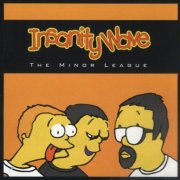 |
The Minor League (2000, 33.57) ***½/T |
|
| The Minor League Stuck in the Root Roller Coaster Ride Lost Days Take Me There Could You Be the One Other People's Game Sleepwalking |
Tonight Rock N˚1 |
|
Current availability:
Chamberlin used:
Insanity Wave are that rarest of things, a Spanish powerpop outfit, from Madrid, 2000's The Minor League being their third album; splendid sleeve art, chaps. Highlights include Lost Days, Sleepwalking and closer Rock N˚1, but, especially on such a short album, there's nothing here that doesn't belong.
Mitch Easter plays his own Chamberlin, with background string swells on Lost Days and upfront strings on Sleepwalking. The band used Easter's studio and talents on their belated follow-up, 2008's Late Night Shift; no Chamby credit, which doesn't mean it isn't there.
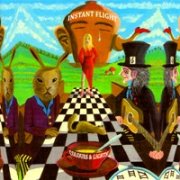 |
Colours & Lights (2004, 51.56) ****/TT½ |
|
| Running Around Colours & Lights Top of the Mountain Her Mystery Under the Moonlight She Passes By Freeway Flowers on My Grave |
Tarantula Kites Such a Slow Way Home Will You Think of Me? |
|
Current availability:
Mellotron used:
London-based Instant Flight incorporate members from all over Europe, proving the city's unasked-for role as the continent's music capital (go on, prove me wrong). Their Hammond-heavy psych comes as welcome relief to these jaded ears, proving themselves true scholars of the era with Freeway, a classic slice of (the retrospectively-dubbed) freakbeat, a sub-genre usually passed over by modern psychonauts. In truth, there isn't a bad track here, other highlights including opener Running Around (great organ solo), the proto-prog of Top Of The Mountain (even greater organ intro) and their fab cover of Simon Dupree & the Big Sound's fab Kites, with none other than Arthur Brown on vocals (he also sings on Freeway, while Sundial's Gary Ramon guests on Under The Moonlight).
Lucie Rejchrtova plays Mellotron, sounding really quite real, with Arabic-esque strings on Top Of The Mountain, flutes on Her Mystery, complete with a solo and Kites, although the background strings on Under The Moonlight and She Passes By sound rather less authentic and I haven't even highlighted Will You Think Of Me? All in all, then, a fine album, previously criminally unbeknownst to me, well worth shelling out for on musical grounds, never mind several good Mellotron tracks. Excellent. Incidentally, their follo-up, 2008's Endless Journey, appears to use samples and is reviewed here.
See: Samples etc. | Arthur Brown
 |
Interface III (2000, 53.16) ***½/TT½ |
|
| Perspective 5-7 Warae Perspective 1 Jaran Perspective 2 Ishitro Hide and Seek (Due) |
Perspective 3 Gate of Interface Part 1 Gate of Interface Part 2 |
|
Current availability:
Mellotron used:
It would be fair to say that Interface, like several earlier Japanese prog outfits, have something of a King Crimson fixation, particularly in the guitar department, in this case, that of Masahiro Noda. Although you'd think it was their third album, several sources confirm that Interface III is their sole release, firmly in the tradition of Bi Kyo Ran, memorably described to me by a Kobe record shop owner as, "The Japanese King Crimson!" Well, here's another Japanese King Crimson, as good at it as you'd expect from a country where musicianship is generally top-notch, top tracks including Warae, Jaran and Ishitro.
Noda also plays Mellotron (did someone say 'Fripp'?), sounding pretty damn' real, frankly, with strings on Warae, Jaran, Hide And Seek (Due) and Gate Of Interface Part 2, played both 'straight' (Jaran) and 'weird' (Gate Of Interface). I don't know whether this is still available on CD, but, as with what appears to be the whole of Mellow's catalogue, it's available on their Bandcamp page, complete with a cover scan so bad that I couldn't use it. Worth hearing.
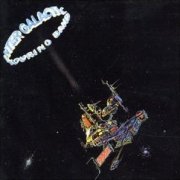 |
Intergalactic Touring Band (1977, 47.18) */T½ |
|
| Approach (Overture) Silver Lady Universal Zoo/Why Starship Jingle Heartbreaker Reaching Out First Landing Space Commando |
Robot Salesman Love Station A Planet Called Monday/Epilogue Keeper Keep Us |
|
Current availability:
Mellotron used:
The Intergalactic Touring Band were, ironically, a studio outfit put together in 1976, consisting of a couple of members of US progressives Fireballet, synth whizz Larry Fast (a.k.a. Synergy) and a cast of thousands. The concept appears to be a science-fictional band zooming around the galaxy playing to the music-starved masses of Ursa Minor or wherever. Sadly, this has all the hallmarks of a 'vanity project', funded by a record company too out of touch to realise the futility of the whole affair; by the time of its release it was hopelessly outdated, Wil Malone's rather cheesy orchestral arrangements dating from an earlier (and by no means better) age. I'm afraid to say that it's difficult to recommend this in any meaningful way; vocalists such as Rod Argent, Annie Haslam, Dave Cousins, Arthur Brown, Meatloaf and even Rossi and Parfitt from Status Quo (!), along with instrumentalists of the calibre of Anthony Phillips, Percy Jones and Clarence Clemons were unable to drag the leaden material up to a listenable level. Sorry to be so harsh, but Intergalactic Touring Band was not a very pleasurable listening experience. This is why punk happened.
Larry Fast's Mellotron? Flutes and choirs on album opener Approach, then choirs on Silver Lady and Robot Salesman, though it's hardly the most audible Mellotron you'll ever hear. There's a 'thanks' in the album's expensive-looking booklet to US Mellotron distributors 'Bill Eberline and Sound Sales Inc. for use of their Mellotron tape library', too. Surprising they didn't use it a little more, then.
See: Fireballet | Synergy | Rod Argent | Annie Haslam | Arthur Brown | Dave Cousins | Anthony Phillips
 |
Intra (1998, recorded 1976-90, 71.50) ***½/T |
|
| Soda for a Symphony Jerk The Voice of Winter Heroes of Ganymede Farmboy One Last View Son of the Astronaut The Machine Three's |
Ritual Sea Bird The Projectionist Circle Kings |
|
Current availability:
Mellotron used:
Intra were one of a host of obscure US progressive outfits from the '70s, many of whom never released an album at the time, only to be rediscovered during the '90s CD reissue boom. 1998's Intra is, it seems, an incomplete record of the band's recorded history, losing two tracks from what appears to be their lone contemporaneous release, 1984's Chemical EP, also featuring a mere three tracks from a 1980 show, presumably to fill out the disc.
Given that the CD's contents span a near-fifteen-year period, it's hardly surprising that some stylistic variation is apparent, although the band kept the quality up right through the horrid '80s. Or have reissue specialists Shroom carefully curated the disc, quietly losing their less appealing material? What we get is, in many ways, typical US prog, angular in places, featuring hints of King Crimson, Yes and Gentle Giant, amongst other influences, their 1976 tracks (the first five here) featuring sax, as against the expected keys. Highlights? Hard to say; if you like your prog American and choppy, as against lush, you're unlikely to be disappointed.
Tracks 6 and 7, Son Of The Astronaut and The Machine, are the two Chemical EP excerpts, Tom Rotar's Mellotron strings clearly audible, particularly upfront on the latter, although the strings on Three's, from 1990, sound more like string samples played in a Mellotronic fashion. Should I ever track down the other two EP tracks (T I Sky and Night Of The Thunder Bees), I'll rework this review accordingly.
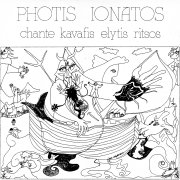 |
Chante Kavafis Elytis Ritsos (1979, 38.09) ***½/½ |
|
| Ithaque Murs Anniversaire La Belle au Jardin Naissance du Jour La Ville Insoumise Prelude To Pedi (l'Enfant) |
Ville Habitudes Etrangers Racines Comprehension Horizons Recherche Nous et le Monde |
|
Current availability:
Mellotron used:
Photis Ionatos is best known, if at all, for his duo with his sister Angélique, who made two albums in the early-to-mid-'70s. 1979's Chante Kavafis Elytis Ritsos was his first solo release, its title referencing the three Greek poets whose work he set to music, Kostas Kavafis, Odysseas Elytis and Yannis Ritsos. It's chiefly acoustic, his guitar (bouzouki?) mostly only accompanied by a small string section, with occasional synth and organ interjections, its obvious highlight being side-long suite La Ville Insoumise, although the album as a whole can be summed up by the phrase 'quietly beautiful'.
Recorded at a Belgian studio, Ionatos had access to a Mellotron, possibly played by Daniel Willem, presumably brother of bassist Patrick; looking at the studio's work on Discogs, it appears the Willems played multiple sessions there. It only turns up twice, and then minimally, with distant choirs on opener Ithaque (although the track's strings are real) and equally sparse choirs on Recherche, part six of La Ville Insoumise. Not only has this never been reissued on any format, but those in the know seem to think it never will be. Because? There's a small but enthusiastic audience for this kind of obscurity, and this is better than most. Someone? Anyone?